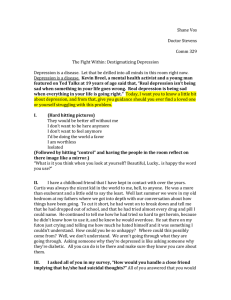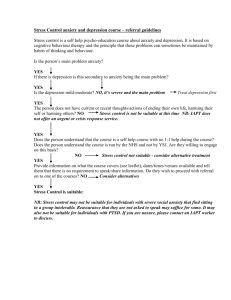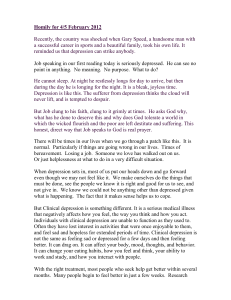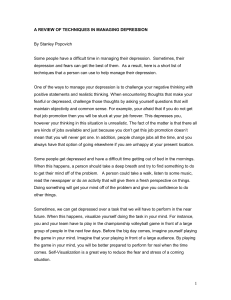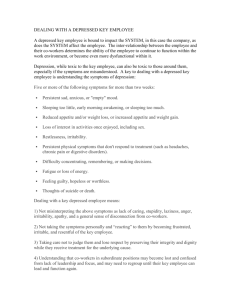07-8WW Stress 2013
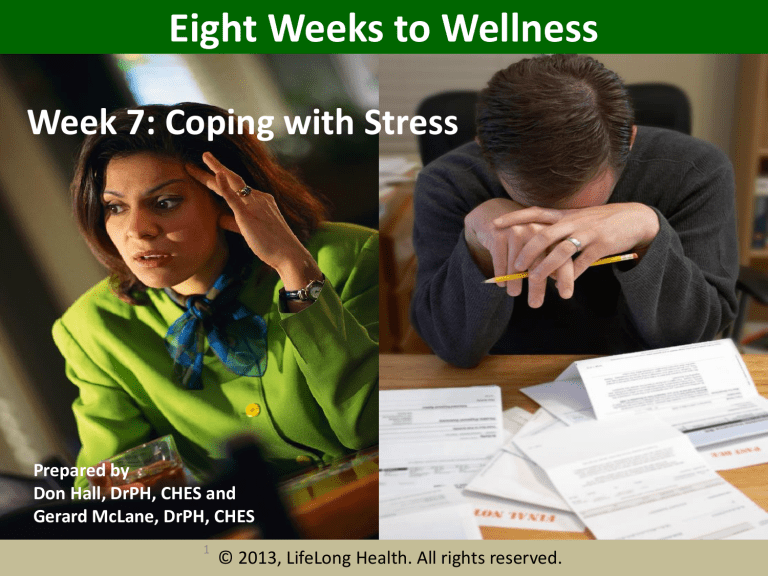
Eight Weeks to Wellness
Week 7: Coping with Stress
Week 7:
Coping with Stress
Prepared by
Don Hall, DrPH, CHES and
Gerard McLane, DrPH, CHES
Gerard McLane, DrPH, CHES
1
© 2013, LifeLong Health. All rights reserved.
Definitions
• Stress
– The body’s response to any demand made upon it
– The general wear and tear of daily living
• Stressor
– Demands, events, and situations that cause stress
• Eustress
– Good stress — beneficial to life and goals
• Distress
– Excessive stress — destructive to physical, mental, and emotional health
2
Sources of Stress
• Daily hassles
• Change
• The environment
• Work/Career
• Finances
• Relationships
• Conflict between people (inter-personal)
• Internal conflicts (intra-personal)
3
Understanding Stress
• Stress is additive.
– The body’s response to stress is the sum of all the stressful situations it is exposed to.
• The goal is to manage, not avoid stress.
– Keep stress within manageable limits and use it to your advantage when possible.
• Stress is not “Out There” — It is “In
Here”.
– Stress is our response to situations as we perceive them.
– We have control over our response to life events.
4
Stressor Your
(Initiator)
Coping
Response Skills
Conflict
Change
Work demands
Loss
Inherited traits
Experience
Attitude
Self-image
Eustress
Productive
Beneficial
Communication
Self-talk
Relaxation
Support systems
Health practices
Distress
Nonproductive
Destructive
5
Stress Signals Quiz
How many stress signals do you have?
[ ] Minor problems can seem overwhelming.
[ ] I feel nervous. I worry about many things.
[ ] I can’t stop thinking about my problems.
[ ] I feel frustrated or angry much of the time.
[ ] I feel tense much of the time.
[ ] I sometimes find it hard to go to sleep.
[ ] I often feel tired and have little energy.
6
Stress Can be Harmful to Your Health
Symptoms
• Headaches
• Backache
• Sleep disturbances
• Fatigue
• Anxiety
• Worry
• “Burn-out”
• Low productivity
• Apathy
Related Diseases
• Frequent colds or flu
• Digestive upsets
• Depression
• Cancer
• Asthma
• High blood pressure
• Heart disease
• Stroke
7
Case Study: INTERHEART Study
• The large international
INTERHEART study included 24,767 people, studied in 52 countries, to determine risk factors for heart disease.
• They found stress to be a significant risk factor for heart disease.
Stress Damages the Heart
• High level of stress damage the arteries and heart, increasing the risk for heart disease.
• In the INTERHEART study, stress in it’s various forms contributed to 33% of all heart attacks.
Lancet 364:953-962
Stress at Work and Home
• People indicating they
often had problems with stress at work or home were 45% more likely to have a heart attack than those with low levels of stress.
• People with constant stress were more than twice as likely to have a heart attack.
Mortality Rate (RR)
2,5
2,0
1,45
1,5
1,0
1,00
0,5
0,0
2,17
Low Often Continual
Stress Level
Lancet 364:953-962
Other Stressors
• Financial distress increased risk of a heart attack by 33%
• Major life events
(divorce, loss of loved one, intra-family conflict, loss of job, etc.) increased risk by 48%
• Depression increased risk by 55%
Lancet 364:953-962
Stress and Mortality Rates
• A study by Oregon State
University looked at chronic stress and mortality in a group of 1,443 middle-aged men
• The study included 18 years of observation
• Men were grouped into three groups, low, moderate, and
high stress, based on how many stressful life events they experienced in their lives.
Examples of Stressful Life Events
• Death of a spouse or other family member
• Major deterioration in financial state
• Loss of a job
• Marital separation or divorce
• Deterioration of relationship with spouse or a child
• Assuming responsibility of a parent
• Major trouble with a boss or coworkers
• Child’s divorce or separation
• Decrease in responsibilities at work or retiring
Journal of Aging Research, article ID 896109, 10 pages
Effect of Chronic Stress on Mortality
• Those who experienced either moderate or high levels of stress continually over the 18 years were 37-42% more likely to die than those who had low stress levels even after adjusting for health habits, and education.
Mortality Rate (RR)
1,5 1,42
1,0
0,5
0,0
1,00
1,37
Low Moderate High
Stress Level
Journal of Aging Research, article ID 896109, 10 pages
Resilience
• People who fared the best with moderate or high stress and had lower mortality rates were those who:
– Had good social support; were married
– Those who had good overall health (rated as
“excellent health”)
Journal of Aging Research, article ID 896109, 10 pages
Learning to Cope
• Stress is unavoidable, but if stress is excessive and continual it will damage both physical and mental health.
• Learning effective coping skills is essential for good health, as are building strong support systems, and overall health.
Coping With Stress - Two Common Approaches
Negative
• Denial, pretend all is OK
• Drugs, sleeping pills, tranquilizers, aspirin
• Binge eating, drinking
• Indulging — staying up late, sleeping in, wasting time
• Passivity/Procrastination
• Worry, imagine the worst
• Self pity, emotions control you
Positive
• Take responsibility/control
• Set priorities/delegates
• Limit demands (says “No”)
• Take one thing at a time
• Balance stress with relaxation response
• Take care of health: adequate rest, physical activity, regular meals
• Strengthen support system
16
Click to edit Master title style
10 Ways to Beat Stress
Before it Beats
You
17
1. Adopt a Healthy Lifestyle
• Poor health habits add to your stress load (smoking, skipped meals, late hours, etc.).
• A healthy lifestyle guards against the damaging effects of stress and increases your resistance to stress.
What You Can Do…
• Be physically active daily
• Eat regular, healthy meals
• Avoid smoking, drugs, and alcohol
• Take time to relax and do something fun daily
• Spend quality time with friends and family
18
Get Adequate Rest
• Even with proper diet and exercise, you can't fight stress effectively without rest.
• You need time to recover from stressful events.
• The time you spend resting should be long enough to relax your mind as well as your body.
• Rest and vacations allow you to take up work again with anticipation, energy, and creativity.
Consider a Nap when Feeling Worn Down
• Some people find that taking a nap in the middle of the day helps them reduce stress and refreshes them to continue being productive.
• Power naps (12-15 minutes) can be a great stress reducer.
Research has shown that people who take naps regularly have fewer heart attacks and live longer than those who seldom nap.
2. Don’t Over-commit
Feeling overwhelmed?
• Limit demands — say no unless you really want to take on a new task.
• Ask for help when needed.
• Set priorities — complete important tasks first; do the rest if there is time.
• Delegate — for example, get everyone you live with to share household chores.
Be Realistic
• Many people find life is filled with too many demands and too little time. For the most part, these demands are ones we have chosen.
– Set realistic goals and expectations. It’s OK to realize you can’t be 100% successful all at once.
– Ask your boss, a successful friend, or an advisor for help to know how best to reach your goals.
– Pace yourself, and take time out for yourself.
– Rome wasn’t built in a year.
3. Simplify Your Life
Feeling stressed out?
• Look for ways to simplify your life. This may include:
– Cutting back on time commitments,
– Letting go of material things, and dropping the second job,
– Living within your means or even below your means.
• Peace of mind may be worth more than a new car or home.
4. Master One Big Change at a Time
• Try to avoid too much change in your life all at once.
• When going through a major life event, try to keep other changes that are within your control to a minimum.
• Spend more time with family, friends, and your support group.
Major Life Events
• Starting a new job
• Marriage
• Divorce
• Buying a new home
• Stopping smoking
• Death of a loved one
• Serious illness
24
5. Learn to Relax
• Relaxation is the antidote for stress.
– Take frequent short breaks throughout the day.
– If feeling uptight, practice slow, deep breathing.
– Practice progressive relaxation.
– Use visual imagery.
– Take a vacation.
• Plan time to relax and have fun every day.
When you feel yourself becoming annoyed or uptight, try this 15-second mini-break.
Step 1
Eyes closed, remember a pleasant memory.
Step 2
Smile within, using your mouth and eye muscles.
Step 3
Take a slow, deep breath and relax your whole body.
Step 4
Take another deep breath and move into a positive, productive attitude.
© LifeLong Health 26
Break the Stress Response with Relaxation
•
Take a warm bath
•
Listen to favorite music
•
Hike in the woods
•
Watch a funny movie
•
Phone a friend
•
Eat out
•
Take a nap
•
Play with your children
•
Enjoy a sunset
Relaxation counters everything bad that stress does to the body helping restore a normal, healthy physiology.
27
More Ways to Relax
•
Write in your diary
•
Walk/play with your pet
•
Meditate
•
Pray
•
Trim the roses
•
Read a good book
•
Enjoy a hobby
•
Sit in the sunshine
•
Get a massage
28
6. Be Physically Active
Physical activity relieves stress by:
• Relieving pent-up emotions
• Relaxing the muscles
• Improving sleep
• Releasing endorphins, the body’s natural way to feel better
• Distracting you from problems
• Improving mood
• Improving resistance to stress
Make Physical Activity a Daily Habit
• Choose activities you enjoy — think of exercise as play.
• Exercise with a friend.
• Play Frisbee, ball, or hide-andseek with your children.
• Take 10-minute walks in the morning, at lunchtime, and in the evening.
• Take the stairs, walk to the store, work in the garden, mow the lawn, walk the dog.
“When the weather will permit, all who can possibly do so ought to walk in the open air every day, summer and winter.
A walk, even in the winter, would be more beneficial to the health than all the medicine the doctor may prescribe.”
E. G. White, Counsels on Health, p. 52
31
7. Be Good to Yourself
• Listen to your self-talk:
– Do you feel good about your accomplishments?
– Or, are you always putting yourself down?
• Acknowledge your successes; focus on your good qualities.
• Look for ways to build your selfesteem.
• Don’t be your own worst enemy by being overcritical.
• Make changes where needed, but also learn to accept yourself and like yourself as you are.
Do something special for yourself regularly.
32
Maintain a Healthy Self-Esteem
• When you are feeling overwhelmed, remind yourself of what you do well.
• Remember how it felt when you did something really well.
• Maintain a healthy sense of self-esteem.
8. Feed Your Emotional Life
• Everyone needs love to survive and cope with life.
• People with good social support systems handle stress and crisis better than people without support.
• Invest time in developing loving and supporting relationships.
• Don’t isolate yourself.
• Belong to a caring church or other support group.
34
9. Resolve Conflicts
• If something is bothering you, don’t just stew about it, take action to resolve it.
• In resolving conflicts between people, try:
– Reflective listening … let him or her know you understand their point of view.
– Describe your position …
I feel, I need, I think.
– Explore alternatives … there is usually a mutually acceptable solution if you take time to find it.
35
• Choose a good time and place to discuss issues.
• Plan what you want to say.
• Start with what you agree on.
• Don’t discount or reject the ideas of others.
• Never use name calling, blame, or personal attacks; stick to the issues.
• Respect others’ views, even if they are different from your own.
36
10. Keep Balance in Your Life
Balance:
• work with recreation,
• weariness with rest,
• disappointment with hope,
• sadness with humor,
• worry with trust,
• stress with relaxation,
• doubt with optimism,
• excitement with quiet times,
• loneliness with friendship,
• rush with serenity,
• clutter with order,
• fear with peace.
Live by Your Values
• Examine your values and live by them.
• The more your actions reflect your beliefs, the better you will feel, no matter how busy your life is.
• Do what really counts as important for you.
God grant me the serenity to accept the things I cannot change, courage to change the things I can, and wisdom to know the difference.
Reinhold Niebuhr
39
Plan Quiet Times
• Plan quiet times of refreshing every day
• Study, meditate, pray, and rejuvenate your mind and spirit.
like eagles. They will run and not grow weary. They will walk and not faint.
Is. 40:31
Is. 40:31
Learn to Love, Forgive, and Accept
• Don’t be a victim of bad feelings.
• Forgiveness releases the control and power of the offending person on your life.
• Letting go of hurts, resentment, and bitterness can make way for compassion, love, and peace.
• Forgiveness leads to:
– And less stress and bad feelings
– Healthier relationships
– Better mental well-being
A Value that Lightens Stress
Love is patient and kind; love does not envy or boast; it is not arrogant or rude.
It does not insist on its own way; it is not irritable or resentful; It does not rejoice in wrong doing, but it rejoices with the truth.
Love bears all things, believes all things, hopes all things, endures all things.
Love never ends.
Paul, I Corinthians 13:4-7 (TEV)
In Summary . . .
• Learn to laugh at yourself and life.
• Develop good friends.
• Have hope for the future.
• Look for the best in everyone.
• Use positive self-talk, don’t put yourself down.
44
In Summary . . .
• Plan time to relax daily.
• Take time to have fun.
• Take time for yourself.
• Learn to accept yourself as you are.
• Replace guilt with forgiveness and trust.
• Maintain a positive outlook — be optimistic.
45
Stress Quiz - Review
1.
T F Stress can be beneficial or destructive.
2.
T F Stress is caused by difficult people and difficult situations.
3.
T F Depression is an attitude problem.
4.
Name two health behaviors that may help prevent depression: _______ and ______.
5.
Three effective strategies when feeling overwhelmed are
_______, _______, or _______.
6.
T F Change, even good changes, can be stressful.
7.
The best antidote for stress is ________ .
8.
T F Physical activity is a good stress releaser.
9.
T F Isolating yourself is a good way to deal with stress.
10. Two positive ways to resolve conflicts are ___ and ___.
Week 7 Assignments
1. Read Week-7, “Coping with
Stress”
2. Do something fun and relaxing
15 – 20 minutes each day.
3. When you are feeling stressed, stop and break the stress cycle with relaxation.
4. If you’re unhappy take the
Depression Symptom checklist
(handout)
5. Continue to tally points you earn from all wellness goals achieved each day.
A LifeLong Health Presentation
Enjoy Your Adventure to Better Health
www.myLifeLongHealth.Org
Be
*
Healthy iPhone App
• Use the iPhone App called
Be * Healthy to get an accurate estimate of your:
– Health status and wellness score
– Health age appraisal
– Projected life expectancy
– Guidelines for adding years to your life
– Watch slide shows to know how to make changes
– Track your progress all year
Available on Apple’s iTunes App Store A LifeLong Health product.
Be
*
Healthy Pro iPad App
• An attention getting health
awareness tool for use at:
– Health fairs
– Employee wellness programs
– Church groups
– Health classes
– Doctor’s and Dentist’s offices
– Fitness centers
• Complete interactive
Lifestyle Assessment on iPad
• Print a Personal Wellness
Report to a Wi-Fi AirPrint equipped printer or send report to an email address
Assessment includes questions on fitness, weight, nutrition, mental and emotional health, health habits, blood pressure, BMI, and a variety of other optional health screening tests including aerobic capacity.
Available on Apple’s iTunes App Store A LifeLong Health product.
Be
*
Healthy Pro iPad App
Lifestyle assessment is based on findings from:
– Harvard’s Professional
Follow-up and Nurses
Health studies, and
– LLU’s Adventist Health study
• Assessment Includes:
– 14 lifestyle factors and
– 9 health screening tests
(optional)
– Strongly linked to better health and a longer life.
A 2 page personal wellness report includes:
– Health age and longevity appraisal
– Years of potential added life by making changes
– Personal recommendations and preventive actions for:
• Improving health habits
• Fitness and weight
• Nutrition and eating
• Mental & emotional health
– To help your participants prevent disease and enjoy lifelong health
Available on Apple’s iTunes App Store A LifeLong Health product.
“I wish above all things that you prosper and be in good health.”
3 John 2
© LifeLong Health 53
Emotions and High Blood Pressure
Individuals who often felt uptight, anxious, unhappy, or depressed were twice as likely to develop high blood pressure in the next nine years compared to people who were not anxious or unhappy much of the time.
High Blood Pressure, RR
200
200
100
100
0
Seldom unhappy or anxious
Often unhappy or anxious
Archives of Family Medicine
Emotions and Heart Ischemia
• Feelings of frustration, tension, and sadness were associated with up to three times the risk of ischemia in people with coronary artery disease in the subsequent hour.
• Feeling happy and in control were associated with a risk lower than
“Neutral” or at rest.
• Ischemia is a lack of oxygen to the heart muscle due to decreased blood flow.
Risk of Ischemia (RR)
3
3,0
2
1
0
1.0
Neutral
0,7
Negative emotions
Positive emotions
Study summary: Feelings of tension, frustration, and sadness, can more than double the risk of myocardial ischemia in the subsequent hour.
JAMA 277(19):1521-1526
Worry and Heart Health
• A study of 1,759 people for 13.7 years looked at worry and heart disease.
• Researchers found increased risks for heart attacks in people with increased levels of worry, particularly over:
– financial issues and
– health concerns
Relative Risk of Heart Attack
300
254
200
170
100
100
0
Seldom worry
High worry score
Higher worry score
Harvard Health Letter
Hostility and Heart Health
• Duke University studied anger and heart disease in 12,986 people.
• Those who scored high in anger had 2.7 times as much heart disease six years later.
• People with moderate anger developed 35% more heart disease than those scoring low in anger or hostility.
Heart disease, relative risk
250
200
150
100
50
0
100
135
No anger Moderate anger
270
High anger
Circulation 101(17):2034-39
Anxiety Attacks
• Almost everybody feels anxiety and panic occasionally. Some symptoms …
– Your head pounds
– You sweat
– You get hot flashes or feel very cold
– You have trouble breathing
– You tremble, feel dizzy, and tingling
– You feel nauseous
– You feel out of control
58
Anxiety Assessment
• Do you often feel nervous and jittery?
• Are you often unable to relax?
• Do you constantly worry?
• Do you feel shortness of breath when stressed?
• Are you fearful in social situations?
• Do you often feel trapped or confined?
• Is your stomach often upset?
• Do you often have thoughts you can’t stop?
• Do you relive traumatic experiences from the past?
59
Coping With Anxiety
• Try to identify trigger situations (what leads to an attack)
– Call a friend when you feel an attack coming
– Avoid trigger situations when possible
– Relax or go for a walk with a friend
• Join a support group
• Get a medical exam
• Take medications if prescribed
• See a counselor
60
Depression Lowers Chances of Survival
In a study of 1,250 people who survived a heart attack, researchers found that
10 years later…
– 35% of those who were not depressed had died.
– 42% of those who were mildly depressed had died.
– Over 50% of those who were seriously depressed had died.
Deaths (%)
60
52
40
20
42
35
0
Seriously depressed
Mildly depressed
Not depressed
American Journal of Cardiology
A Proverb
Being cheerful keeps you healthy. It is slow death to be gloomy all the time.
Proverbs 17:22, TEV
62
Depression and Heart Attacks
• A study of 730 Danes found that depressed heart patients were …
– 70% more likely to have another heart attack, and
– 60% more likely to die than those who were not depressed.
Circulation and The John Hopkins Medical Letter-Health, After 50 63
Depression & Quality of Life
n=1024
100
75
50
25
0
60
33
73
40
67
31
Depresion
No depression
66
30
Symptom burden
Physical limitations
Diminished quality of life
Fair/poor health
Measures of Health Status
Journal American Medical Association 290:215-221
PET Brain Scan in Healthy & Depressed Person
Journal American Medical Association
Exercise and Depression
• Researchers randomly divided 156 sedentary, clinically depressed persons into two groups:
– One group received medication therapy.
– Another group only ran at a moderate pace ½ hour daily.
• After 16 weeks their depression was reevaluated
– Exercisers improved as much as those on medication.
– Only exercisers showed improvement in mental abilities such as concentration, planning, and organization.
Duke University
Folic Acid and Depression
• Tufts University studied depression and blood folate levels in 3,000 people.
– Those reporting major depression:
• Feeling worthless
• Difficulty concentrating
• Loss of energy
• Changes in appetite and sleep patterns, etc.
– Had significantly lower blood folate levels than people who had never been depressed.
– Previous research showed folate helped improve the condition and also helps antidepressants work better.
Tufts University Health and Nutrition Letter
67
Walking Slows Mental Decline
• A study of 5,925 people age 65+
• Tested mental acuity at start and end
• People who walked the least (less than ½ mile per day) had the most mental decline
• People who walked the most (18 miles per week) had the least mental decline
• The chance of mental decline decreased 13% for every extra mile walked
• Researcher’s summary, “Exercise, such as walking, is one of the best ways to preserve your mental ability.”
American Academy of Neurology
68
Anxiety Attacks
• Almost everybody feels anxiety and panic occasionally. Some symptoms …
– Your head pounds
– You sweat
– You get hot flashes or feel very cold
– You have trouble breathing
– You tremble, feel dizzy, and tingling
– You feel nauseous
– You feel out of control
69
Anxiety Assessment
• Do you often feel nervous and jittery?
• Are you often unable to relax?
• Do you constantly worry?
• Do you feel shortness of breath when stressed?
• Are you fearful in social situations?
• Do you often feel trapped or confined?
• Is your stomach often upset?
• Do you often have thoughts you can’t stop?
• Do you relive traumatic experiences from the past?
70
Coping With Anxiety
• Try to identify trigger situations
(what leads to an attack)
– Call a friend when you feel an attack coming
– Avoid trigger situations when possible
– Relax or go for a walk
• Get help from a mental health counselor or doctor if needed.
71
Stress also Contributes to Depression
Depression is an illness that can have lasting emotional and physical effects, including:
• Feelings of worthlessness, guilt, or indecision
• Difficulty concentrating
• Change in appetite or sleep habits
• Loss of energy, interest, or pleasure
• Loud, violent, troubled, agitated, slowed, or anti-social behaviors
• Drug or alcohol abuse, and
• Difficulty with interpersonal relationships.
72
Simple Screening Questions for Depression
During the past month:
– Have you often been bothered by feeling down, depressed, or hopeless?
– Have you often been bothered by having little interest or pleasure in doing things?
If you answered “YES” to one or both:
– Follow up with a more detailed assessment for depression – get help. Depression can be treated.
JAMA 290:215-221 73
Depression and Anxiety
• Anxiety and depression are common health problems – usually treatable
• If you’ve been bothered by feeling down, depressed, hopeless, or anxious…
– Talk to a mental health counselor.
– Ask your doctor for help.
– Prescribed medications can help correct chemical imbalances in the brain.
74
Be Happy
Don't be afraid that your life will end, be afraid that it will never begin.
There is no better time than right now to be happy.
Happiness is a journey, not a destination.
So work like you don't need money.
Love like you've never been hurt,
Dance like no one's watching.
From “The Daffodil Principle”
